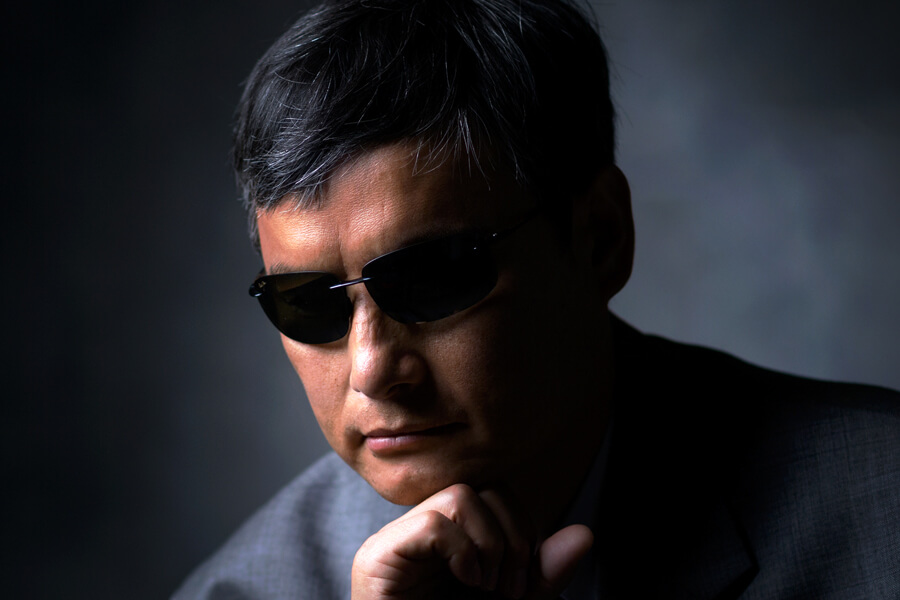Chinese human rights activist recounts life of persecution in lecture on AI and freedom

Purdue’s College of Liberal Arts and College of Engineering teamed up to host “The Barefoot Lawyer.” The lecture was hosted and introduced by Professor Fenggang Yang, Professor of Sociology at Purdue.
Blind since infancy due to a fever that destroyed his optical nerves, Chen was raised in a poor village and was not allowed to attend school until the age of 18. He later enrolled in Nanjing University of Traditional Chinese Medicine, studying acupuncture and massage – the only courses available to blind students. While there, he audited legal classes and became a self-taught lawyer, dedicating himself as an advocate for the poor, disabled, and persecuted.
His advocacy efforts were not appreciated by the authorities, and he endured more than seven years of harassment, including several house arrests, secret detention, and more than four years of imprisonment. His home village was invaded by government-sponsored thugs to keep Chen cut off from all external communications.
He made a dramatic escape from 20 months of brutal house arrest in April 2012, drawing the attention of international media. The American Embassy in Beijing secured his safety before high-level diplomatic negotiations resulted in his being offered a visiting scholar position at New York University. By May 2012, Chen, his wife Yuan, and their two children were granted U.S. Visas, and the family left Beijing for America.
Today, Chen is a frequent media commentator as well as a guest speaker at conferences and events around the world. He serves as a visiting fellow at the Catholic University of America, distinguished senior fellow in human rights at the Witherspoon Institute, and senior distinguished advisor to the Lantos Foundation for Human Rights and Justice.
At his Purdue engagement on Sept. 17, Chen addressed the audience in Mandarin Chinese, reading from a Braille tablet with his assistant translating his talk into English.
Alina Alexeenko, the College’s associate dean for undergraduate education and an AAE professor, attended and enjoyed the event.
“Chen Guangcheng’s story is pure inspiration and a great example of power imparted by education, even if somebody just learns to read at the age of 18. “
Chen discussed the unfair prosecution he faced from Chinese state authorities as a result of the legal defense work he and his wife performed on behalf of powerless Chinese residents. He told about his efforts defending the rights of disabled people, and how as a result to this day in Beijing, blind citizens have the right of free public transportation. He also spoke about his work to bring to public view the atrocities of forced abortions and sterilizations due to China’s one-child policy.
Chen shared his concerns about the dangers of massive state surveillance by the Chinese Communist Party (CCP), enabled by some of the latest artificial intelligence (AI) technology, including facial recognition. He also mentioned AI-based motion recognition software Watrix and instances in which Western technology companies are collaborating in building a giant “electrified digital cage” surrounding China.
After his remarks, Chen entertained questions with a range of political views and interests.
“He spoke with a lot of humor with his answers in Chinese and was often greeted with bursts of laughter by those understanding the language,” Alexeenko relayed.
One audience member queried Chen about his opinion of protests in Hong Kong. The people of Hong Kong feel that their freedoms are continually being diminished, Chen answered, “like frogs in a pot of water being slowly warmed before being boiled.”
One student, in apparent support of official Chinese policies, commented that China has a low poverty rate and its companies fare well economically compared to those in developed countries. Chen’s reply touched on the many lies that are propagated by Chinese state officials and the severe restrictions on how information is handled and disseminated.
Another question came from a student who admired Chen’s courage and asked about his hope for the future of a free China. Chen answered that many people in the 1990s would not have believed in the possibility of a USSR collapse, and he likened it to vulnerability of current Communist rule in China. He added that communism is nothing more than hypocritical exploitation of the Chinese people by the “Communist elite”, who then send their families to enjoy the comforts of life in the West.
Yang is the Purdue director of the Center on Religion and Chinese Society and a professor of sociology, religious studies, and the School of Interdisciplinary Studies (SIS). He earned his Ph.D. from Catholic University of America (Washington, D.C.), where Chen is a visiting fellow. Yang specializes in sociology of religion, religious change in China, and immigrant religion in the United States.
Chen’s memoir, The Barefoot Lawyer: A Blind Man’s Fight for Justice and Freedom in China, was released in 2015 and has been translated into eight languages.
Alexeenko said some of the sections of the book resonate well with the impact-making and grit pillars of the University’s STEPS to LEAPS program.
“Every person has infinite strength. Every action has an important impact. We must believe in the value of our own actions.”
YouTube Video: Giant Leaps Series Chen Guangcheng September 17, 2019
Source: Alina Alexeenko
